
Hejdeby Church is a medieval church in Hejdeby on the Swedish island of Gotland. The church was built in stages during the 13th century, and contains medieval murals from two different periods. Hejdeby Church is part of the Diocese of Visby within the Church of Sweden.

Ala Church is a medieval church in Ala on the Swedish island of Gotland. Its oldest parts date from the 12th century. Damaged by fire in the 1930s, it still contains medieval murals and its original baptismal font. The church belongs to the Church of Sweden and lies within the Diocese of Visby.

Anga Church is a 13th century church in Anga on the Swedish island of Gotland. It is one of the most well-preserved Romanesque churches on Gotland, and was possibly preceded by a stave church. Inside, the church is decorated with medieval murals from three different periods, as well as some medieval furnishings. Some wooden sculptures from the church are today exhibited in a museum in Visby. The church belongs to the Church of Sweden and lies within the Diocese of Visby.

Öja Church is a medieval church in Öja on the Swedish island of Gotland. The church dates from the 13th century and contains an unusual large and elaborately decorated triumphal cross or rood. It belongs to the Church of Sweden and lies within the Diocese of Visby.

Alva Church is a medieval church in Alva on the Swedish island of Gotland. The oldest parts of the church date from the late 12th century; with the halted construction of the tower about a century later, building activity ceased. The church contains medieval murals as well as a number of medieval furnishings and pieces of art. It lies in the Diocese of Visby of the Church of Sweden.

Lye Church is a medieval church on Gotland, Sweden. The oldest parts of the church date from the last quarter of the 12th century, and the last major addition was the disproportionately large chancel, built during the second quarter of the 14th century by a workshop known by its notname as Egypticus. The workshop was also responsible for constructing the largest of the church portals, which is also decorated with Gothic stone sculpture. The tower portal contains sculptures attributed to the Romanesque sculptor Sigraf. The church has been little altered since the end of the Middle Ages. Lye Church contains the largest preserved set of medieval stained glass windows in the Nordic countries, and its interior is also decorated by medieval wall paintings, uncovered in the 1950s. The altarpiece is from 1496, and the church also contains a triumphal cross from the same period.
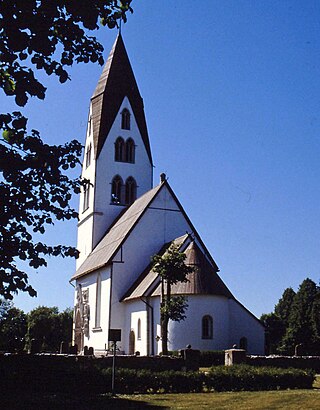
Stånga Church is a medieval church in Stånga on the Swedish island of Gotland. The site of the church has probably been considered sacred since before the Christianization of Scandinavia.

Hemse Church is a medieval Lutheran church in Hemse on the island of Gotland. Preceded by the most well-preserved early stave church discovered in Sweden, the current church dates mainly from the 13th century. It contains sets of medieval murals as well as some medieval furnishings. It is part of the Diocese of Visby.

Eke Church is a medieval church in Eke on the Swedish island of Gotland. The church was built during the 12th and 13th century, with only smaller additions and changes made later. Inside, several medieval murals survive. The church is used by the Church of Sweden and lies in the Diocese of Visby.
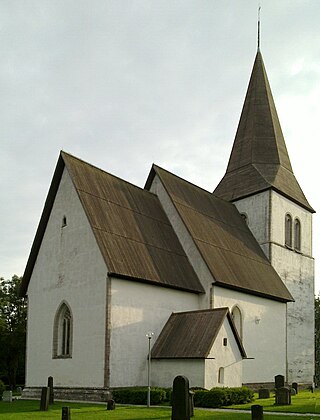
Etelmhem Church is a medieval church on the Swedish island of Gotland. The largely Gothic church contains medieval murals and a 12th-century baptismal font by the sculptor Hegvald. The church is used by the Church of Sweden and part of Diocese of Visby.

Boge Church is a medieval church in Boge not far from Slite on the Swedish island of Gotland. Its main construction period was during the 13th century, but the tower was rebuilt following its collapse in a storm during the 19th century. It contains sets of medieval murals. It belongs to the Church of Sweden and lies in the Diocese of Visby.

Buttle Church is a medieval church in Buttle on the Swedish island of Gotland. It is one of the more well-preserved Romanesque churches on Gotland, and contains both a number of medieval furnishings as well medieval murals. Buttle Church belongs to the Diocese of Visby of the Church of Sweden.

Ekeby Church is a medieval church in Ekeby on the Swedish island of Gotland. The oldest parts date from the 12th century, and the church has been little altered since the end of the 13th century. Its interior is richly decorated with medieval murals. It belongs to the Church of Sweden and lies in the Diocese of Visby.

Endre Church is a medieval church in Endre on the Swedish island of Gotland, in the Diocese of Visby, built from the 12th to early 14th century. It contains medieval murals and several medieval furnishings, and belongs to the Church of Sweden.
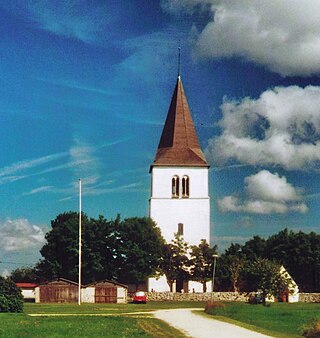
Fleringe Church is a medieval church in Fleringe on the Swedish island of Gotland. Although heavily damaged by fire in 1676, medieval mural fragments survive in the church, which also still has its medieval lychgate and preserved church stables. The church is associated with the Diocese of Visby of the Church of Sweden.

Rone Church is a medieval church in Rone on the Swedish island of Gotland. The Gothic church contains a number of medieval murals. It is part of the Church of Sweden and lies in the Diocese of Visby.
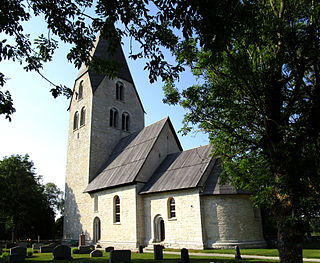
Ganthem Church is a well-preserved Romanesque church in Ganthem on the island of Gotland. It contains murals from the 15th century as well as a number of medieval furnishings. It lies in the Diocese of Visby (Sweden).
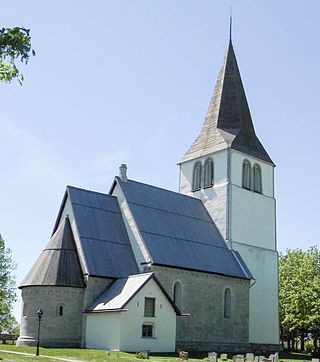
Levide Church is a medieval church on the Swedish island of Gotland. It lies in the Diocese of Visby.

Lojsta Church is a medieval church in Lojsta on the Swedish island of Gotland. The well-preserved church contains several sets of medieval murals. It belongs to the Diocese of Visby within the Church of Sweden.
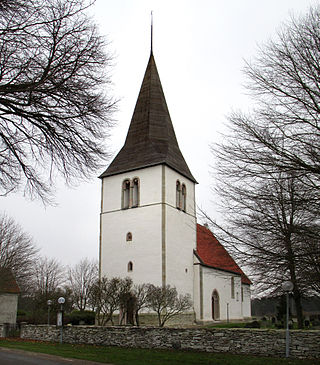
Silte Church is an almost unaltered medieval church on the Swedish island of Gotland. Silte Church was built during the 13th century and contains a number of medieval fittings as well as murals. It belongs to the Church of Sweden and lies in the Diocese of Visby.






















